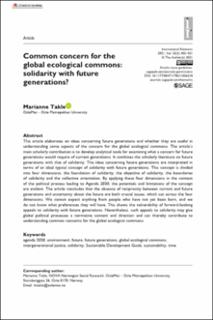| dc.contributor.author | Takle, Marianne | |
| dc.date.accessioned | 2021-11-02T14:12:22Z | |
| dc.date.available | 2021-11-02T14:12:22Z | |
| dc.date.created | 2021-09-12T15:26:01Z | |
| dc.date.issued | 2021-07-30 | |
| dc.identifier.citation | International Relations. 2021, 32 . | en_US |
| dc.identifier.issn | 0047-1178 | |
| dc.identifier.issn | 1741-2862 | |
| dc.identifier.uri | https://hdl.handle.net/11250/2827327 | |
| dc.description.abstract | This article elaborates on ideas concerning future generations and whether they are useful in understanding some aspects of the concern for the global ecological commons. The article’s main scholarly contribution is to develop analytical tools for examining what a concern for future generations would require of current generations. It combines the scholarly literature on future generations with that of solidarity. The ideas concerning future generations are interpreted in terms of an ideal typical concept of solidarity with future generations. This concept is divided into four dimensions: the foundation of solidarity, the objective of solidarity, the boundaries of solidarity and the collective orientation. By applying these four dimensions in the context of the political process leading to Agenda 2030, the potentials and limitations of the concept are evident. The article concludes that the absence of reciprocity between current and future generations and uncertainty about the future are both crucial issues, which cut across the four dimensions. We cannot expect anything from people who have not yet been born, and we do not know what preferences they will have. This shows the vulnerability of forward-looking appeals to solidarity with future generations. Nevertheless, such appeals to solidarity may give global political processes a normative content and direction and can thereby contribute to understanding common concerns for the global ecological commons. | en_US |
| dc.description.sponsorship | The author received financial support from NOVA, Norwegian Social Research, OsloMet, Oslo Metropolitan University. | en_US |
| dc.language.iso | eng | en_US |
| dc.publisher | SAGE Publications | en_US |
| dc.relation.ispartofseries | International Relations;Volume: 35, issue: 3 | |
| dc.rights | Navngivelse 4.0 Internasjonal | * |
| dc.rights.uri | http://creativecommons.org/licenses/by/4.0/deed.no | * |
| dc.subject | Agenda 2030 | en_US |
| dc.subject | Environmental issues | en_US |
| dc.subject | Future generations | en_US |
| dc.subject | Global ecological commons | en_US |
| dc.subject | Intergenerational justice | en_US |
| dc.subject | Solidarity | en_US |
| dc.subject | Sustainable development goals | en_US |
| dc.title | Common concern for the global ecological commons: solidarity with future generations? | en_US |
| dc.type | Peer reviewed | en_US |
| dc.type | Journal article | en_US |
| dc.description.version | publishedVersion | en_US |
| dc.rights.holder | © The Author(s) 2021 | en_US |
| cristin.ispublished | true | |
| cristin.fulltext | original | |
| cristin.qualitycode | 1 | |
| dc.identifier.doi | https://doi.org/10.1177%2F00471178211036218 | |
| dc.identifier.cristin | 1933524 | |
| dc.source.journal | International Relations | en_US |
| dc.source.volume | 32 | en_US |
| dc.source.issue | 3 | en_US |
| dc.source.pagenumber | 19 | en_US |

